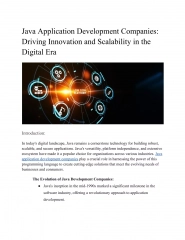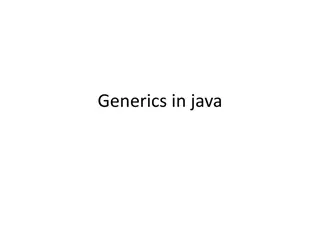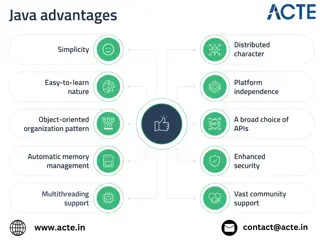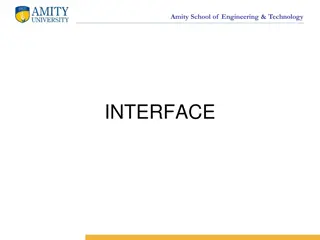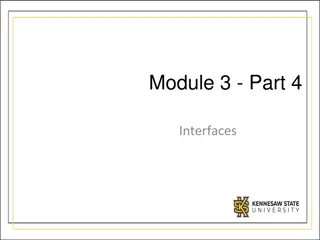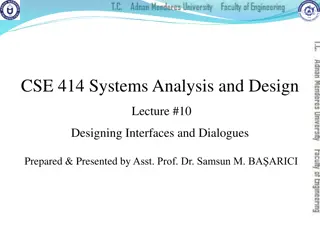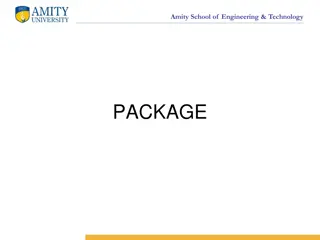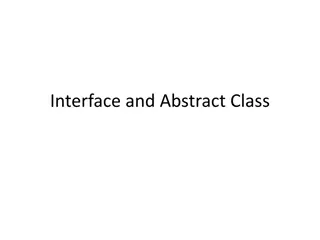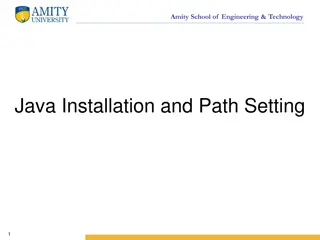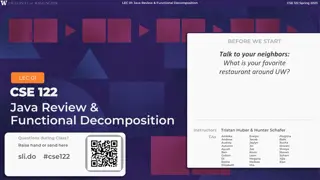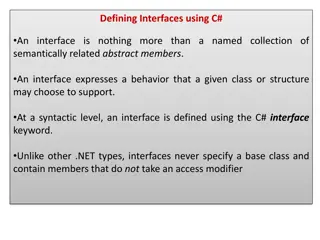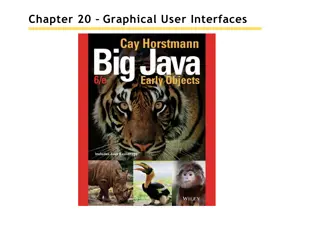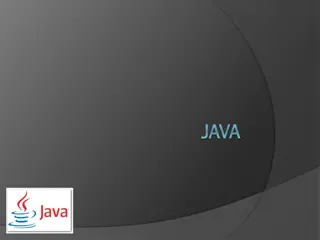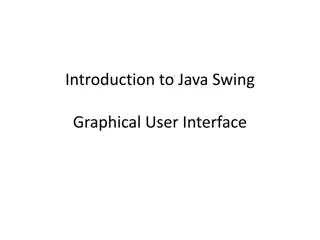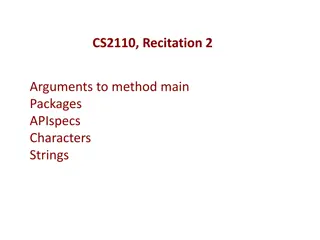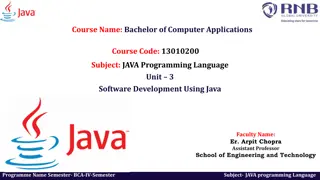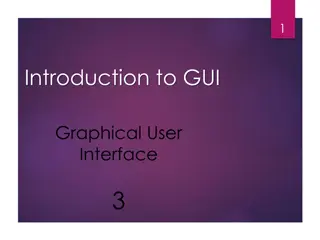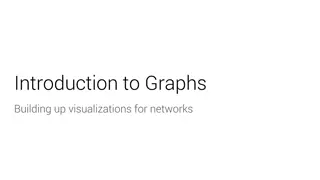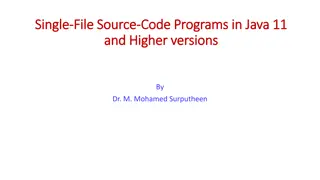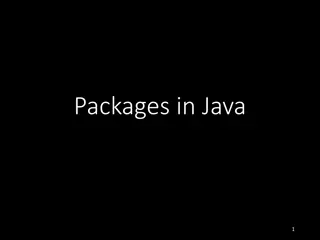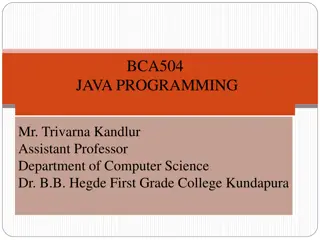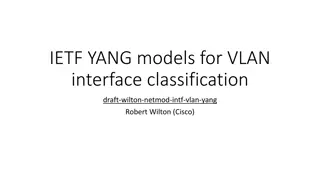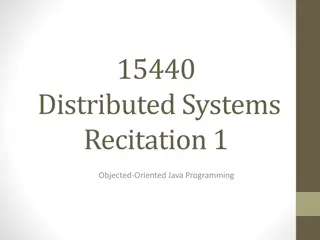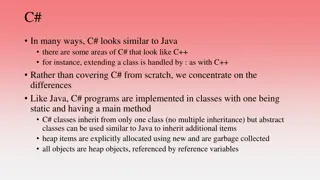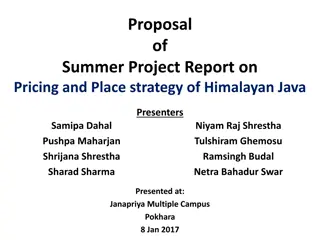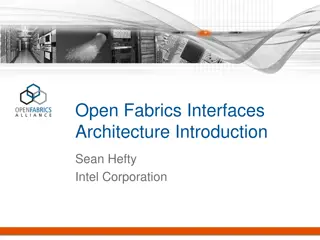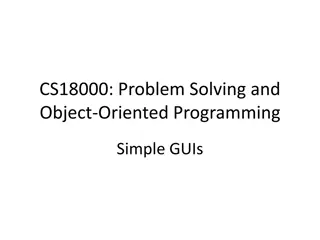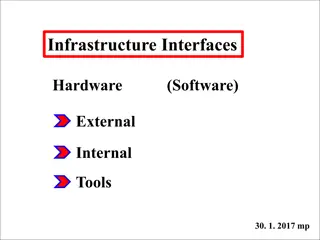Java application development company (1)
In today's digital landscape, Java remains a cornerstone technology for building robust, scalable, and secure applications. Java's versatility, platform independence, and extensive ecosystem have made it a popular choice for organizations across various industries. Java application development compa
2 views • 4 slides
Understanding Generics in Java
Generics in Java allow for parameterized types, enabling the use of different data types in classes, interfaces, and methods. By creating generic entities, such as classes that work with various data types, Java programmers can write more flexible and reusable code. This concept is demonstrated thro
0 views • 16 slides
Understanding Java: The Backbone of Cross-Platform Development
Java stands as a cornerstone in the realm of programming languages, revered for its versatility and robustness. Enrolling in a Java Course in Pune significantly enhances one\u2019s ability to leverage Java\u2019s capabilities effectively. Understandi
1 views • 1 slides
Understanding Java Interfaces in Amity School of Engineering & Technology
Java interfaces are a key concept in object-oriented programming that allows for achieving multiple inheritance. The article discusses how Java interfaces work, their role in defining class behavior, and the differences between interfaces and classes. It also explains the syntax for declaring interf
1 views • 48 slides
Understanding Interfaces in Object-Oriented Programming
Interfaces in OOP provide a way for unrelated classes to share common methods without implementation details. They serve as a set of requirements that must be implemented by classes. By creating interfaces, we can enforce standards and avoid issues like the "Diamond of Death" problem that arises fro
1 views • 17 slides
Designing Interfaces and Dialogues in Systems Analysis and Design
This lecture focuses on the process of designing interfaces and dialogues in systems, discussing methods for interacting with a system, designing human-computer dialogues, and creating graphical user interfaces. It covers guidelines for layout design, structuring data entry fields, providing feedbac
3 views • 62 slides
Understanding Interfaces in Physical Pharmacy
Interfaces play a crucial role in physical pharmacy, dividing phases like solid, liquid, and gas. Liquid interfaces involve surface tension due to cohesive and adhesive forces. This chapter explores the classification and properties of interfaces, shedding light on the behavior of molecules at the b
0 views • 66 slides
Understanding Java Packages and Their Importance in Programming
An exploration of Java packages, their role in structuring code, organizing classes, and enhancing code reusability. Learn about built-in and user-defined packages, the Java API's package organization, and the different types of packages available in Java programming. Discover how packages help in c
2 views • 18 slides
Understanding Interfaces and Abstract Classes in Java
Interfaces and abstract classes play a crucial role in Java programming by defining contracts and blueprints for classes to implement. Interfaces provide a way for classes to declare their capabilities, while abstract classes allow for partial implementation. This article explains the concepts of in
0 views • 19 slides
Amity School of Engineering & Technology Java Installation Guide
In this detailed guide provided by Amity School of Engineering & Technology, learn how to install and set up Java on your system effectively. The step-by-step instructions cover downloading the Java installer, configuring the installation wizard, setting environmental variables, and more to ensure a
1 views • 19 slides
Java Review & Functional Decomposition in CSE 122 Spring 2023
Lecture 01 in CSE 122 covers Java review, functional decomposition, and code quality. Announcements include a Java review session, programming assignments, and reminders on Java syntax. The session encourages active participation through in-class activities using Slido polls. Students are also urged
0 views • 24 slides
Understanding Interactive Programs and Input/Output in Java
Interactive programs in Java allow users to input data through the console, which can be captured and used in the program. This involves using the Scanner class to read user input, and understanding common Scanner methods to process different types of input. Importing Java class libraries is essenti
2 views • 15 slides
Understanding Interfaces in C#
Interfaces in C# define behavior that classes or structures can choose to support. They contain abstract members and do not specify a base class. Interfaces must be implemented by classes to bring functionality. Learn how to define and implement interfaces in C# to create flexible and modular code s
1 views • 22 slides
Understanding Graphical User Interfaces in Java
Learn about designing graphical user interfaces in Java, including layout management, common components like radio buttons and menus, browsing Java documentation effectively, and utilizing inheritance for complex frames. Explore topics such as using layout managers to organize UI components, creatin
0 views • 74 slides
Addressing User Credentials and Security in CCSDS Service Interfaces
The discussion revolves around the need to define user credentials within CCSDS service interfaces for enhanced security. Various aspects such as the lack of specific specifications, authentication requirements, and proposed actions for securing service interfaces are highlighted. Suggestions includ
0 views • 11 slides
Learning Swing with Java Foundation Classes (JFC) and Swing
Java Foundation Classes (JFC) and Swing provide a powerful set of tools for building graphical user interfaces in Java applications. This includes Swing GUI components, pluggable look-and-feel support, accessibility APIs, Java 2D graphics, and internationalization capabilities. By learning Swing wit
0 views • 11 slides
Understanding Java Swing for Building Graphical User Interfaces
Java Swing is a powerful framework for creating graphical user interface applications in Java. It provides a wide array of visual components such as JFrame, JComponent, and JPanel, enabling developers to build interactive and visually appealing applications easily. With Swing, developers can design
0 views • 25 slides
Exploring Graphical User Interfaces (GUIs) and JOptionPane in Java
Introduction to Object-Oriented Programming (OOP) and GUI concepts in Java, focusing on GUI hierarchy, designing GUIs, working with containers and components, utilizing JOptionPane for graphical input/output, and examples of showMessageDialog and showConfirmDialog in Java applications.
0 views • 90 slides
Overview of GUI Development Using NetBeans and Java
Explore the world of GUI development with NetBeans IDE and Java. Learn about building graphical user interfaces, utilizing event listeners, JDBC APIs, frameworks, and visual designers. Follow along with step-by-step instructions and visual examples to enhance your Java programming skills.
0 views • 22 slides
Java Application Development Basics
Learn how to create a Java application with a main method using Eclipse. Understand the concept of method parameters and how to provide arguments when running the application through Eclipse's Run Configurations feature. Explore the structure of packages in Java and the Java API.
0 views • 26 slides
Database Deployment Automation for IMS Interfaces
Automate your database deployments for IMS interfaces within the scope of various systems and interfaces including Wells Fargo, SUNTAX, transport scanners, KODAK, Fujitsu, FDLE, CAMS, DBPR, and more. This includes interfaces to GTA, CAMS, Wells Fargo, Florida Department of Law Enforcement (FDLE), an
0 views • 9 slides
Understanding Java Programming: BCA IV Semester Course Overview
This Bachelor of Computer Applications (BCA) course focuses on Java programming language fundamentals, object-oriented concepts, software development principles, and practical application skills. Students will learn to define Java program features, implement object-oriented features, work with array
0 views • 31 slides
Understanding GUI Layout Managers in Java
Exploring the concepts of GUI layout managers in Java, including how to place GUI objects on a frame using different layout managers such as FlowLayout, GridLayout, and BorderLayout. This guide covers the functionality and characteristics of each layout manager to help you effectively design graphic
0 views • 26 slides
Exploring Graphs: Visualizations and Representations in Java
Delve into the world of graphs with a focus on visualizations for networks and building up graph representations in Java. Explore different graph representations, adjacency lists, and key-value mappings, along with insights on storing and tracking data efficiently using Java data structures. Dive in
0 views • 12 slides
Understanding Single-File Source Code Programs in Java 11
Explore the concept of single-file source code programs in Java 11, where the entire program is contained within a single .java file without external dependencies. Learn how to compile and run these programs both before and after Java 11, and discover the new feature of executing Java programs direc
0 views • 11 slides
Understanding Scanner Class in Java: Reading User Input and Processing Files
The Scanner class in Java's java.util package allows reading input from the keyboard or files. It looks for tokens in the input, reads different types of values, and has methods like nextInt() and nextLine(). You can also read from files by creating a File object. Learn how to use Scanner to interac
0 views • 21 slides
Understanding Packages in Java: A Comprehensive Overview
Packages in Java play a crucial role in organizing and structuring code for efficient reuse and maintenance. They allow you to group related classes together, provide encapsulation, and facilitate code organization. This article dives into the basics of Java packages, advantages they offer, differen
0 views • 19 slides
Introduction to Java Programming: Basics and Applications
Java, developed by James Gosling, is a versatile object-oriented programming language used for mobile, desktop, web applications, servers, games, and more. It is renowned for its platform independence, popularity, ease of use, security, and strong community support. This subject delves into Java fun
0 views • 15 slides
Understanding Interfaces and Classes in Java
Explore the concept of interfaces and classes in Java programming. Learn about defining methods in interfaces, implementing interfaces in classes, and the relationship between classes and interfaces. Discover how interfaces can be used to define a common set of methods that classes must implement, l
0 views • 25 slides
Understanding VLAN Interface Classification in IETF YANG Models
This content delves into the concept of interfaces in networking, focusing on child interfaces. It explains the need for child interfaces to apply separate feature and forwarding rules to specific traffic subsets. The discussion covers the characteristics of interfaces, the hierarchy of child interf
0 views • 10 slides
Java Overview and Basics: Understanding the Fundamentals of Java Programming
Java is a versatile programming language known for its simplicity, security, portability, and high performance. Its history dates back to 1990 when the concept was first suggested, leading to the creation of Java in 1995 by James Gosling. Over the years, Java has evolved with various versions introd
0 views • 65 slides
Overview of Java Programming Language
Java is a versatile and powerful programming language created by James Gosling and others at Sun Microsystems in the 1990s. It aims for portability, reliability, safety, simplicity, and efficiency. With a strong focus on object-oriented programming, Java has evolved over the years with a rich histor
0 views • 33 slides
Mastering Generics in Effective Java: A Practical Guide for Java Programmers
Explore the world of generics in Java through Joshua Bloch's guidance in "Effective Java". Learn the importance of avoiding raw types, leveraging parameterized types for type safety, handling mixing of generic and raw types, and implementing wildcards for flexible and typesafe coding. Enhance your J
0 views • 30 slides
Understanding Interfaces and Abstract Classes in CS/ENGRD 2110 Spring 2016
Explore the concepts of interfaces and abstract classes in the context of computer science with a detailed examination of their characteristics, implementations, and extensions. Learn how classes implement interfaces, utilize interface methods, and extend other interfaces to enhance functionality in
0 views • 11 slides
Understanding Object-Oriented Java Programming Concepts
Explore the fundamentals of object-oriented programming in Java, covering topics such as user-defined classes, inheritance, polymorphism, abstract classes, and interfaces. Learn about packages, encapsulation, access modifiers, overloading methods, and more to enhance your Java programming skills.
0 views • 17 slides
Differences Between C# and Java: A Comparative Overview
C# and Java share similarities in syntax and features, but there are key distinctions that set them apart. From class inheritance to memory management, this comparison highlights the unique aspects of C# programming. Explore how C# diverges from Java in terms of multiple inheritance, explicit heap a
0 views • 16 slides
Study on Pricing and Place Strategy of Himalayan Java Coffee: A Detailed Analysis
This report delves into the pricing and place strategies of Himalayan Java coffee, focusing on factors influencing coffee pricing and selection of outlet locations. The study aims to identify the target market, understand competitive dynamics, and analyze factors impacting coffee sales at Himalayan
0 views • 10 slides
Evolution of OpenFabrics Interfaces Architecture
Evolution of OpenFabrics Interfaces Architecture aims to align software interfaces with application requirements in the realm of high-performance computing (HPC). With a focus on supporting multiple interface semantics, remaining fabric and vendor agnostic, and adaptable in upstream Linux, the initi
0 views • 42 slides
Working with Java GUI Components in Object-Oriented Programming
Explore the fundamentals of creating simple Graphical User Interfaces (GUIs) in Java through the use of components like JOptionPane and dialogs. Understand the transition from text-based interfaces to GUIs, learn about dialog concepts, and discover how to utilize JOptionPane class for interactive mo
0 views • 37 slides
Enhancing Infrastructure Interfaces for Telescope Operations
In the realm of telescope operations, ensuring clear interfaces is crucial for smooth functioning. This involves addressing ill-defined interfaces, database management, locating interfaces, internal and external interface specifications, and tool requirements without the need for adaptations. By foc
0 views • 13 slides
